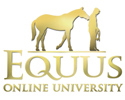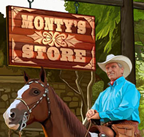The basic concept of operant conditioning is an immediate reaction after a single action of the horse. I am convinced that horses can learn to correlate an "immediate" positive consequence after a series of excercises. Example: canter - trott - walk. (I don't want to stop the horse after the canter to give him a rub.) What do you think? You have other examples? Am I wrong?
Rudi
← back
Horse Behavior and Training
Series of exercises

Rewards
Subscribe to Equus Online University and become a part of Monty's worldwide mission to leave the world a better place for horses and for people too.
Students automatically gain access to special rewards, such as exclusive discounts at the Monty Roberts Online Shop. Visit Monty Roberts Online Shop.



Hi Rudi
Having read this and your other posting about Nevzorov I wondered if you might find the "Evidence Based Horsemanship" book interesting. It is very medically orientated (you will probably find it quite basic as a surgeon!)It's written by Dr Stephen Peters, a Neuropsychologist and Martin Black. Their aim was to take 'horse knowledge' and apply empirical study to establish what is going on in horses brains. The book gets mixed reviews because it is 'medicalised' and if someone has no prior medical knowledge they find the terminology hard going - a an ex nurse I found it very interesting and useful. I am not saying that people with no medical knowledge wont get it I hasten to add!! But its like me trying to read a car manual written by a mechanic - too much like hard work getting my head round the meanings never mind understanding how it works :-). I recommend it though as it explains what is happening neurologically and chemically which may influcene further our views on particular training methods.
Thanks Vicci. I will have a look.
Rudi
Speaking from a dressage rider's point of view, I like to believe that with time and experience, a horse will learn to understand that the reward at the end of a series of actions means the rider is pleased not just with the last part, but with the exercise as a whole.
.
That said, it should be remembered that for each single transition/action you've done within the series, there will be (or at least *should* be) an instant reward; the ever so important release of pressure from reins/legs/seat at each accomplishment. However small, or short, it is, it is still experienced as a reward by the horse. (Or "positive instant consequences", if you like.)
Rudi, from my vantage/experience position, you are absolutely correct. It is most productive, in general terms, however, (depending on the horses ability to learn) that the horse be given "reward" as each of the phases/lessons are progressively initially learned, thence once "connected" as you say, just give lots of praise at the end of each lesson.
What seems to work almost every single time, and a lot of people will not agree, but, it is what it is, and that is verbal praise, it works every bit as good as a nice "pat or rub" as it were. Some horses do not like to be patted or rubbed, but almost all respond well to something like, "...well done,...or good boy/girl" said enthusiastically and with praise as each of the progressive steps are done correctly. Horses are extremely responsive to verbal commands and praise.
At the end of a "series" of lessons I always give a treat, and no, it does not habituate them to "treat hunting and biting". Not if done correctly.
I agree Paul - I have always found the horses I train do respond very well to verbal praise. The mare I am working now is a perfect example. I talk to her as we do things and she responds with her own body language which lets me know exactly how she feels about our progress as well as her responses to what I ask - you just need to look for what they are saying to you. I also agree that treats properly given do not create issues. It is a wonderful feeling to have this level of communication with our horses. Cheers Jan
I agree with Paul, there is nothing wrong at all after a series of lessons or exercises in giving a treat. I have actually found (the hard way) that NOT giving more of a reward than a pat and verbal praise can lead to biting. Beamer had interpreted me not giving him a treat as that he had done something wrong, and I had not corrected it. Over a rather short period of time he became quite frustrated with it, and became quite the biter. I went back to rewarding a series of well done lessons (for example, picking up and holding all 4 hoofs up without a fuss) with a small treat, and I am no longer receiving teeth marks when I go out in his pasture.
Thank you for your comments. "Quality time" is alsp a reward after a series of exercises.
Agreed. Always spend time with them when you have finished your work for the day.